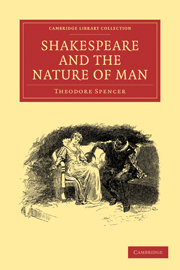Book contents
- Frontmatter
- Preface
- Contents
- SHAKESPEARE and THE NATURE OF MAN
- I Man in Nature: the Optimistic Theory
- II Man in Nature: the Renaissance Conflict
- III The Dramatic Convention and Shakespeare's Early Use of It
- IV Hamlet and Troilus and Cressida
- V Othello and King Lear
- VI Macbeth and Antony and Cleopatra
- VII Shakespeare's Last Plays
- VIII Literature and the Nature of Man
- Index
I - Man in Nature: the Optimistic Theory
Published online by Cambridge University Press: 07 September 2010
- Frontmatter
- Preface
- Contents
- SHAKESPEARE and THE NATURE OF MAN
- I Man in Nature: the Optimistic Theory
- II Man in Nature: the Renaissance Conflict
- III The Dramatic Convention and Shakespeare's Early Use of It
- IV Hamlet and Troilus and Cressida
- V Othello and King Lear
- VI Macbeth and Antony and Cleopatra
- VII Shakespeare's Last Plays
- VIII Literature and the Nature of Man
- Index
Summary
The first thing that impresses anyone living in the twentieth century who tries to put himself into Shakespeare's intellectual background is the remarkable unanimity with which all serious thinkers, at least on the popular level, express themselves about man's nature and his place in the world. In the sixteenth century the combined elements of Aristotelianism, Platonism, Neo-Platonism, Stoicism, and Christianity were almost indistinguishably woven into a pattern which was universally agreed upon, and which, in its main outlines, was the same as that of the Middle Ages. New ideas, such as those which the men of the early Renaissance discovered through their reading of Plato, were treated either as additions to the accepted picture or as fresh ways of interpreting the one universal truth about which there was no question. If there was dispute, as of course there was, it was about details; people were concerned as to how Christ manifested himself through the Eucharist; they did not ask whether or not he did so at all. They did not doubt the importance of reason in the process of knowledge; they discussed what specific functions reason could perform. They did not question the existence of kingship, though they might be violently anxious about who should be king. There was an eternal law, a general order—in the universe, in the ranks of created beings, in the institution of government—and it was the business of thoughtful men to discover it and describe it so that through knowledge of it they could fulfill the end for which God had made them.
- Type
- Chapter
- Information
- Shakespeare and the Nature of Man , pp. 1 - 20Publisher: Cambridge University PressPrint publication year: 2009First published in: 1943



